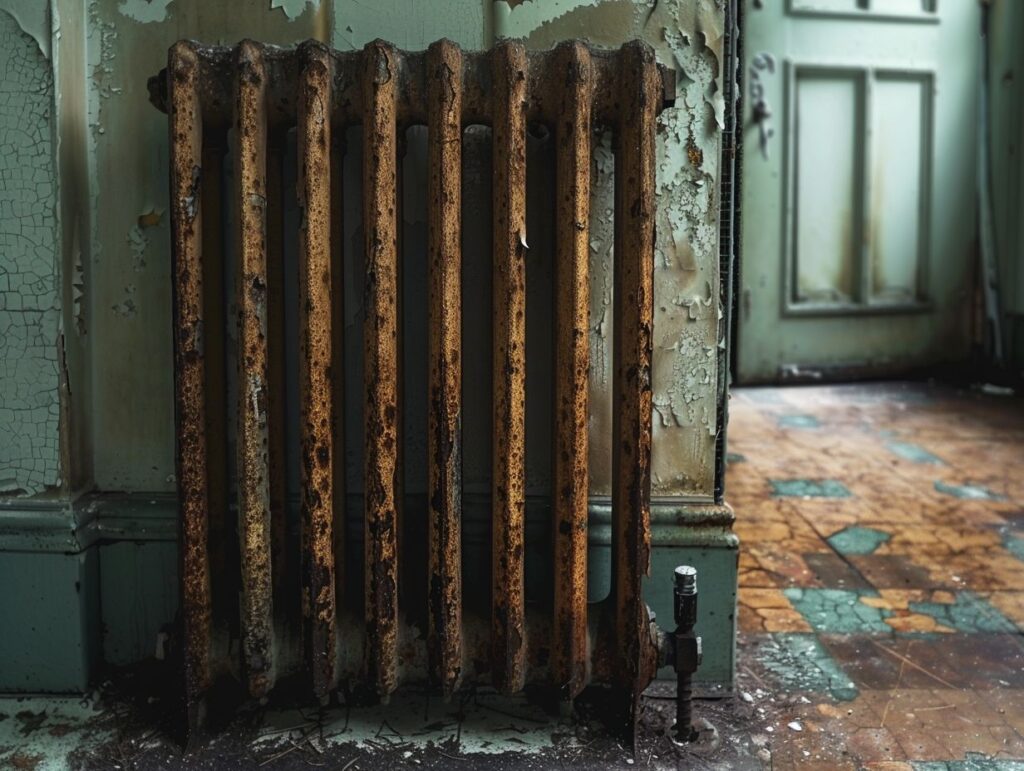Rust formation on hallway radiators is a common issue that can affect both the efficiency and aesthetics of your heating system. Understanding the chemical reactions involved, such as exposure to moisture, air, and certain materials, is crucial in preventing this problem.
In this discussion, we will explore the possible causes of rust on hallway radiators, the effects it can have on their performance, and provide practical tips on how to prevent and treat rust to keep your radiators in top condition.
Key Takeaways:
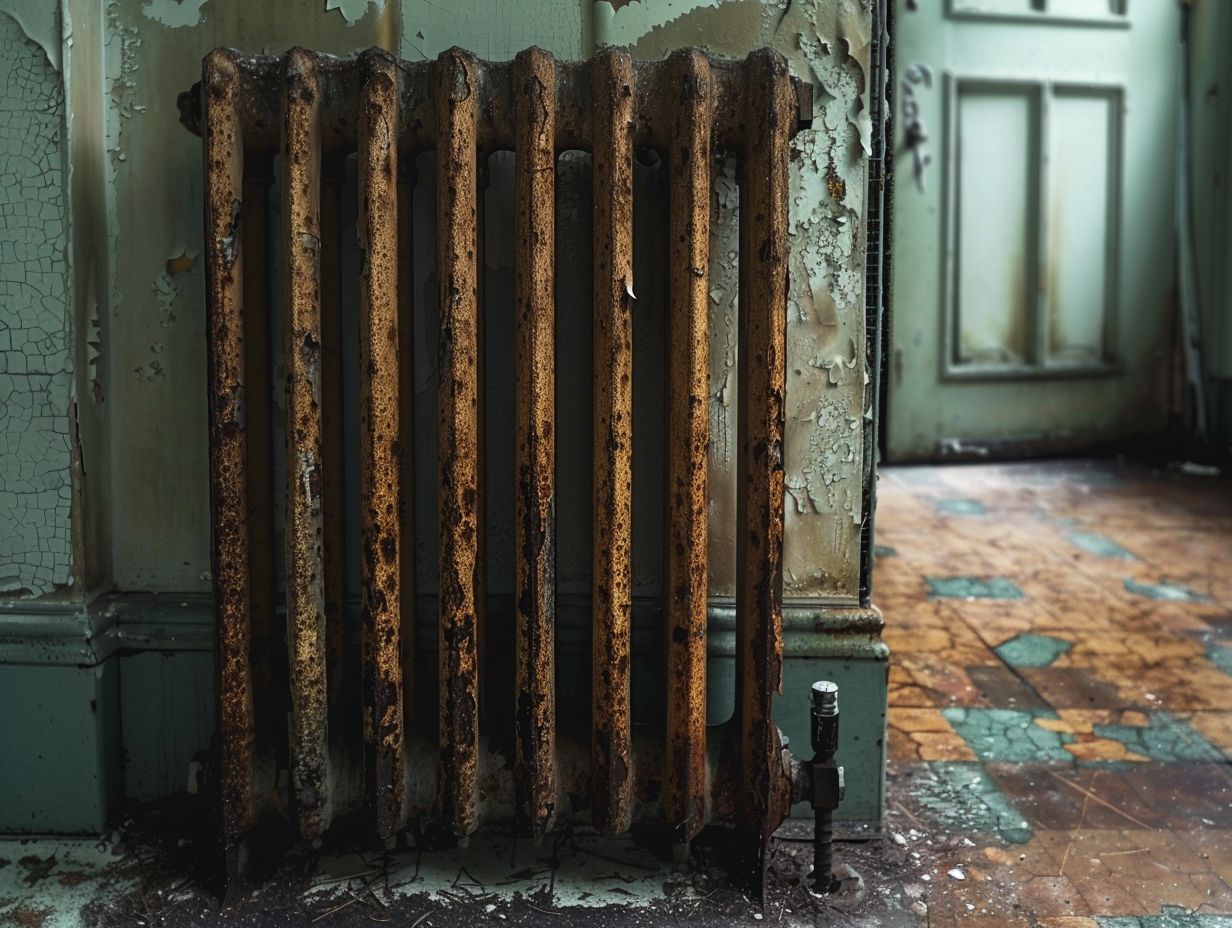
- Moisture and humidity, exposure to air and oxygen, and poor quality materials can all contribute to rust formation on hallway radiators.
- Rust can lead to reduced efficiency and performance of hallway radiators, as well as potential health hazards if left untreated.
- Regular maintenance and cleaning, as well as applying protective coatings and treatments, can help prevent rust from forming on hallway radiators.
Possible Causes of Rust on Hallway Radiators
Regarding the formation of rust on corridor radiators, several factors come into play. Elements such as moisture and humidity levels, exposure to air and oxygen, and the quality of materials used in radiator construction can all contribute to this issue.
It is crucial to identify these causes to effectively implement prevention strategies and uphold the integrity of heating systems.
Excessive moisture in the air can result in the build-up of water droplets on radiator surfaces, creating an environment that is conducive to rust formation. When oxygen interacts with these water droplets, it triggers a corrosion process that can weaken the metal components of the radiator.
Additionally, the quality of materials utilised in the construction of radiators significantly influences their resistance to rust and corrosion.
Routine maintenance practices, such as power flushing, play a vital role in combating rust formation by eliminating sludge build-up and enhancing the longevity of radiators through the promotion of optimal heat transfer.
By addressing these factors and adopting preventive measures, one can effectively mitigate the risk of rust formation on corridor radiators and ensure the prolonged functionality of heating systems.
Moisture and Humidity
Moisture and humidity levels in your environment can expedite the rusting process within radiators. When water droplets come into contact with metal surfaces, particularly in humid conditions, the probability of rust development rises.
An engineer can evaluate the impact of moisture on radiator components and provide recommendations for suitable preventive measures.
Additionally, environmental variables such as air quality and temperature can significantly influence the corrosion processes affecting radiators. The presence of air pollutants like sulphur dioxide or carbon monoxide can accelerate rusting reactions.
Furthermore, fluctuating temperatures might lead to condensation on the radiator’s surface, consequently enhancing the oxidation of metal components. Understanding the interplay of these factors with moisture is essential for devising strategies to mitigate rust formation and extend the longevity of radiators.
Exposure to Air and Oxygen
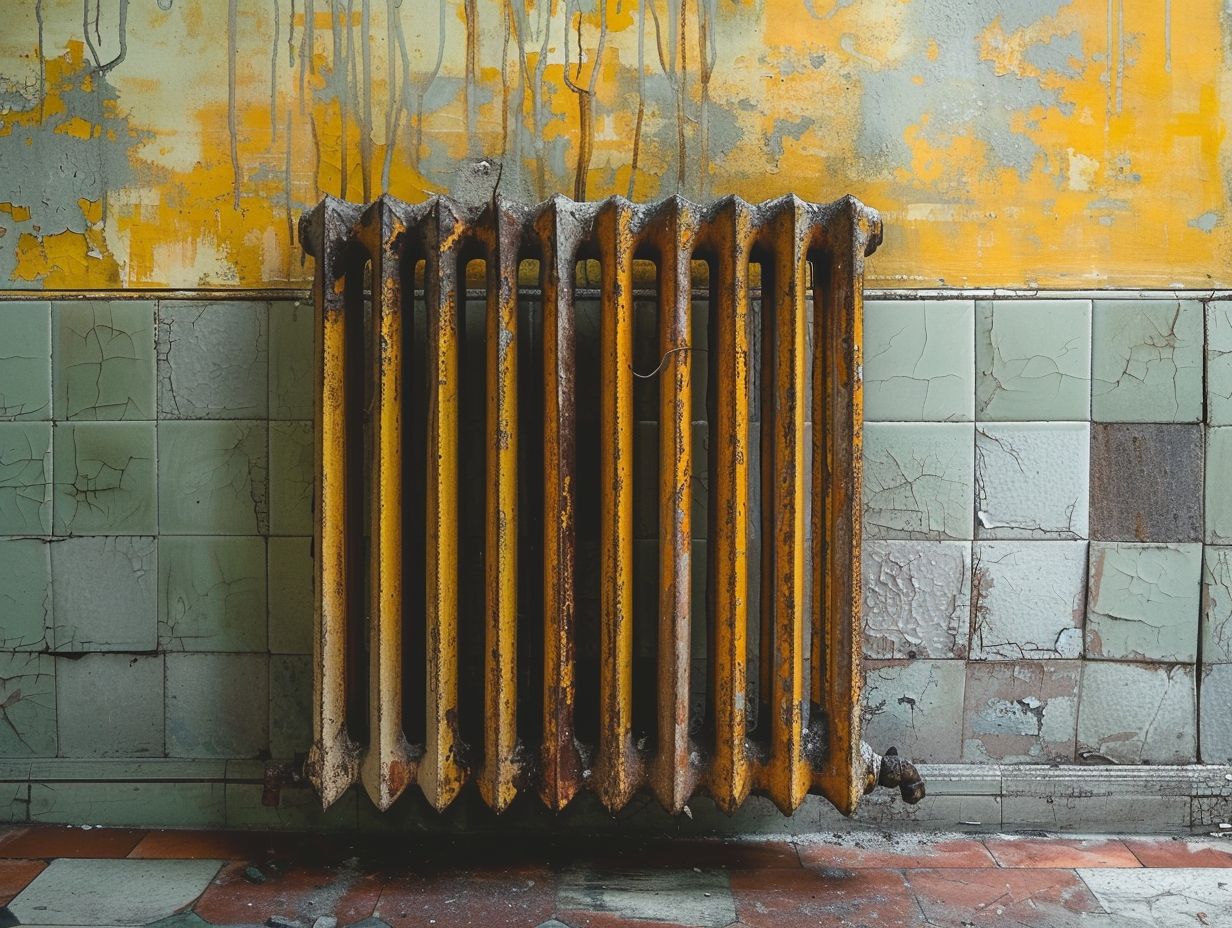
Exposure to air and oxygen is a primary cause of rust formation on corridor radiators. When metal surfaces are in contact with oxygen in the presence of moisture, oxidation reactions occur, leading to the gradual deterioration of radiator components. Understanding the role of air exposure is crucial for effective rust prevention.
This process of oxidation is accelerated in radiators due to the constant circulation of water, which introduces moisture into the system. Over time, the accumulated rust and corrosion can impede the flow of water through the radiator, reducing its efficiency in heating the surrounding area.
Power flushing, a maintenance technique that cleans out accumulated debris and rust particles from the system, can help restore optimal radiator performance and prevent further deterioration caused by rust formation.
Quality of Materials
The susceptibility of radiators to rust and corrosion is significantly impacted by the quality of materials used in their construction.
Radiators designed with high-grade metals are less likely to rust, resulting in improved efficiency and longevity. Investing in radiators made from durable materials is a proactive step to mitigate the formation of rust.
The utilisation of high-grade metals in the manufacturing of radiators enhances their ability to withstand harsh conditions that contribute to corrosion and rust. These metals offer superior resistance to moisture and heat, which are common factors in rust formation.
Additionally, the design of radiators plays a critical role in preventing rust; sleek and well-sealed designs inhibit moisture penetration, providing further protection against corrosion.
Therefore, opting for designer radiators constructed from top-quality materials not only enhances the aesthetic appeal of a space but also ensures efficient heating systems with minimal risk of rust-related issues.
Effects of Rust on Hallway Radiators
The presence of rust on corridor radiators can lead to reduced efficiency and performance of your heating system. Corroded components hinder the proper circulation of heat, resulting in uneven heating distribution and increased energy consumption.
Addressing rust-related issues promptly is crucial to prevent further damage to your radiator systems. Rust acts as a barrier within your radiator, inhibiting the flow of hot water and diminishing the heat output.
With rust accumulation, your radiators may struggle to reach and maintain optimal temperatures, forcing your heating system to work harder to compensate. This not only strains the system but also drives up energy costs.
A power flush can help remove rust build-up and debris, restoring your radiator’s efficiency and prolonging its lifespan. Regular maintenance and inspection are essential in combating corrosion and ensuring efficient heating performance.
Reduced Efficiency and Performance
The accumulation of rust in radiators can lead to decreased efficiency and performance of your heating system. Corrosion on metal surfaces can obstruct heat transfer, resulting in subpar heating output and the potential formation of cold spots within rooms. It is imperative to conduct regular maintenance and cleaning to address these efficiency issues.
Furthermore, when rust develops in radiators, it can contribute to the creation of sludge within the heating system. This sludge, comprised of corroded metal particles and debris, further impedes the circulation of hot water and disrupts the radiator’s ability to generate consistent heat.
As the sludge builds up, it not only affects the radiator’s efficiency but also strains other system components like pumps and valves, leading to possible breakdowns and expensive repairs. Promptly addressing rust and corrosion is essential to uphold optimal heating performance and prolong the lifespan of your entire system.
Potential Health Hazards
For those of you managing properties or concerned about indoor air quality, it’s important to recognise that rust in radiators goes beyond just affecting heating efficiency. The presence of rust can actually create potential health hazards for occupants.
Corroded components have the potential to release harmful particles or gases, which can compromise indoor air quality and trigger respiratory issues. Taking prompt action to address rust is vital to ensure both the optimal performance of the heating system and the well-being of those within the space.
Inhaling these corroded particles can result in lung irritation and exacerbate existing respiratory conditions, such as asthma or bronchitis. Prolonged exposure to pollutants related to rust can escalate to more serious health concerns, including respiratory infections or even enduring lung damage.
Alongside the direct health risks, rust in radiators can also diminish overall indoor air quality, creating a stale or musty environment that may worsen allergies and respiratory symptoms among occupants.
Preventing Rust on Hallway Radiators
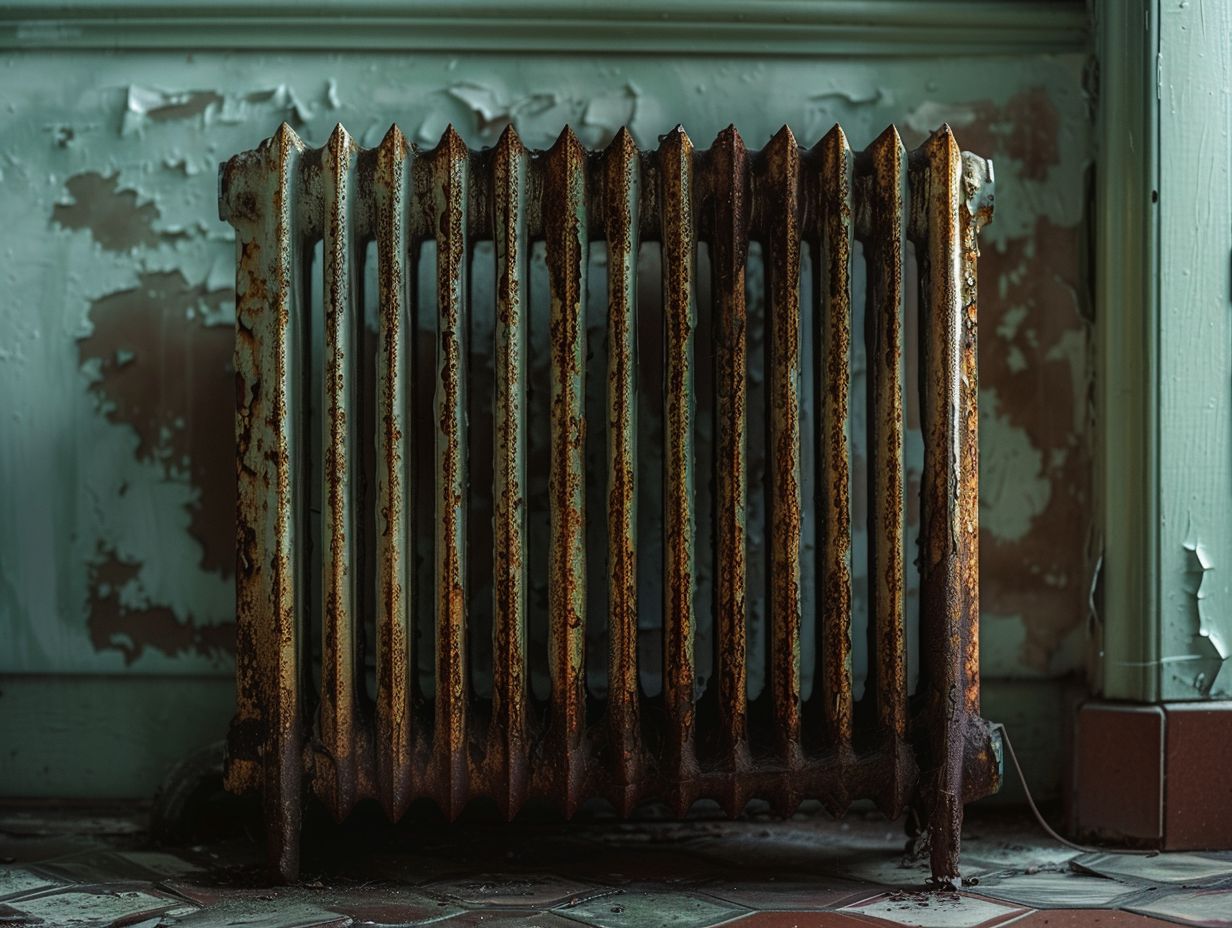
Implementing proactive maintenance and cleaning tips is crucial for preventing rust formation on your hallway radiators. Regular inspection, cleaning routines, and protective coatings can help mitigate corrosion risks and extend the lifespan of your heating systems. By following these preventative measures, you can ensure optimal radiator performance and efficiency.
Regularly checking for any signs of rust on your radiators and promptly addressing them through cleaning and applying rust-resistant coatings is essential. Periodically power flushing the radiators can prevent sediment build-up, which contributes to corrosion.
Keeping your radiators clean from dust and debris can also help prevent rust formation. It is recommended to use mild cleaning solutions and soft brushes to avoid damaging the radiator surface while removing any accumulated dirt or grime.
Maintenance and Cleaning Tips
Regular maintenance and cleaning are essential for preventing rust formation on corridor radiators. You should use a vacuum cleaner or duster to effectively remove dust and debris from the surfaces of the radiators, ensuring optimal heat transfer efficiency.
Consider scheduling professional cleaning services or power flushing to eliminate sludge buildup and minimise corrosion risks.
By removing dust and debris on a regular basis, not only will you keep the radiators looking clean, but you will also ensure that they function efficiently.
A vacuum cleaner with a brush attachment can be particularly useful for reaching the radiator fins’ nooks and crannies. Additionally, dusting with a microfiber cloth or a duster can help prevent dust accumulation.
Regarding maintaining radiators, especially in high-traffic areas like corridors, a combination of at-home cleaning methods and occasional professional services is recommended to prolong the heating system’s lifespan and efficiency.
Protective Coatings and Treatments
By applying protective coatings and treatments to hallway radiators, you can significantly reduce the risk of rust formation and corrosion.
Anti-corrosion sprays or paints create a barrier between metal surfaces and environmental factors, extending the radiator’s lifespan and maintaining heating efficiency. It is crucial to conduct regular inspections and reapply coatings to ensure long-term rust prevention.
These protective measures are essential for preserving the aesthetic appeal of radiators and preventing unsightly rust spots and corrosion damage.
By integrating anti-corrosion products into your regular maintenance routines, homeowners can guarantee that their radiators remain in optimal condition, delivering consistent and efficient heating during colder months.
Investing in high-quality protective coatings not only protects the radiator but also enhances overall indoor air quality by preventing potential rust particles from circulating in the air.
Frequently Asked Questions
Why do hallway radiators rust?
Hallway radiators can rust due to a combination of moisture, oxygen, and metal. This creates an electrochemical reaction that results in corrosion and rust formation on the surface of the radiator.
How does moisture contribute to rusting of hallway radiators?
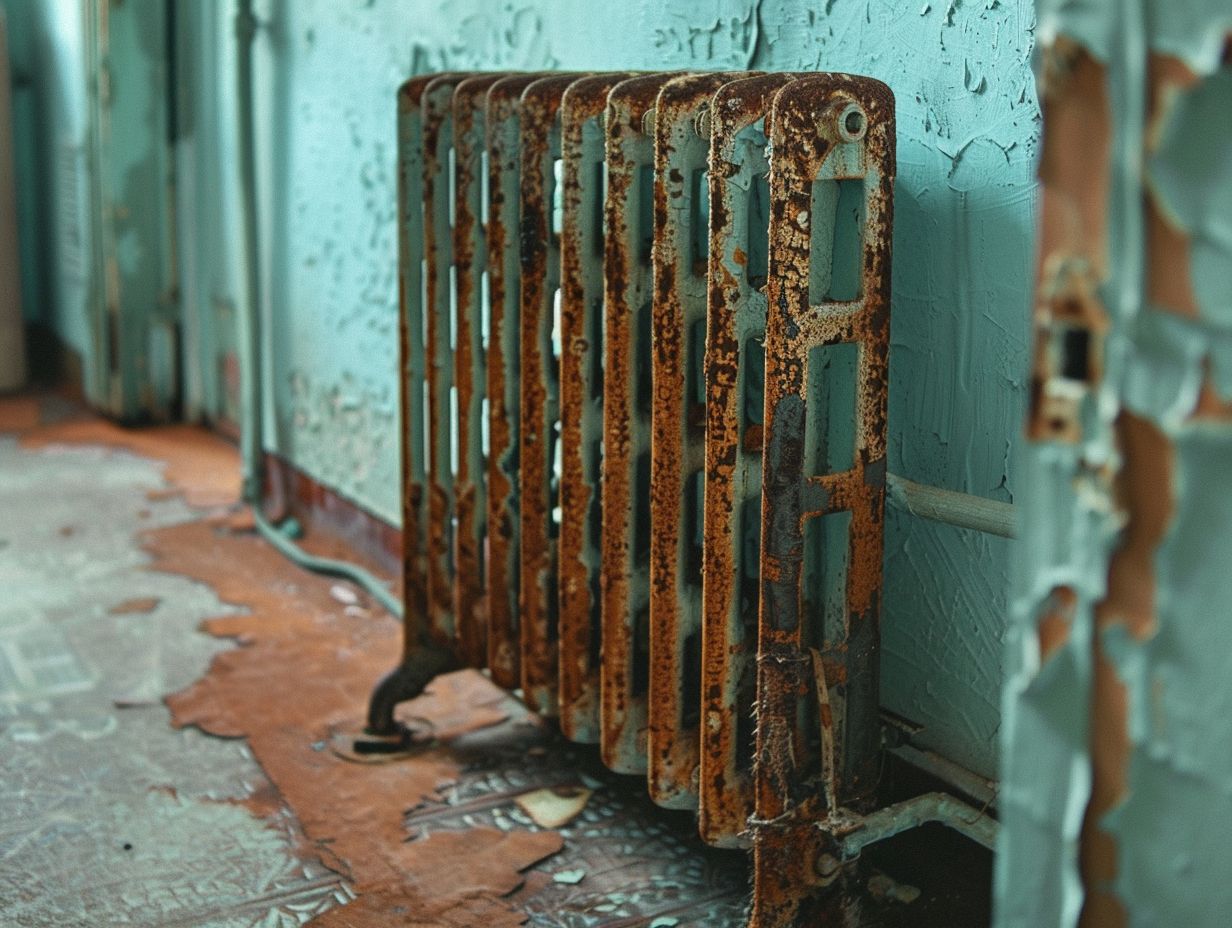
Moisture from the air or water can seep through cracks or gaps in the radiator’s coating, causing the metal to come into contact with water. This leads to the formation of rust as the water reacts with the metal.
Can the type of metal affect the likelihood of rusting in hallway radiators?
Yes, some metals are more prone to rust than others. For example, iron and steel are highly susceptible to rusting, while aluminium and stainless steel have a higher resistance to corrosion and rust formation.
How can oxygen accelerate the rusting process in hallway radiators?
Oxygen is essential for rust formation as it reacts with the metal in the presence of moisture. The more oxygen present in the air, the faster the corrosion process will occur.
What are some common causes of moisture and oxygen in hallway areas?
Moisture can come from a variety of sources, such as high humidity levels, leaking pipes, or condensation on windows. Oxygen is present in the air and can also enter through cracks or gaps in the radiator’s coating.
Can proper maintenance prevent rusting in hallway radiators?
Yes, regular maintenance and upkeep can help prevent rusting in hallway radiators. This includes keeping the area dry, repairing any leaks or cracks, and applying a protective coating or paint to the radiator to prevent moisture and oxygen from reaching the metal surface.

